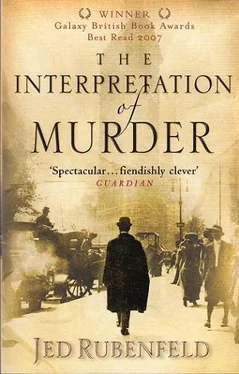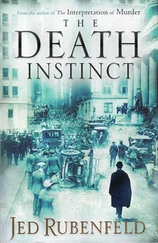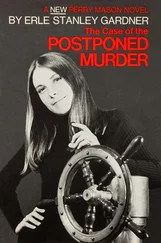Jed Rubenfeld - The Interpretation of Murder
Здесь есть возможность читать онлайн «Jed Rubenfeld - The Interpretation of Murder» весь текст электронной книги совершенно бесплатно (целиком полную версию без сокращений). В некоторых случаях можно слушать аудио, скачать через торрент в формате fb2 и присутствует краткое содержание. Жанр: Исторические приключения, на английском языке. Описание произведения, (предисловие) а так же отзывы посетителей доступны на портале библиотеки ЛибКат.
- Название:The Interpretation of Murder
- Автор:
- Жанр:
- Год:неизвестен
- ISBN:нет данных
- Рейтинг книги:5 / 5. Голосов: 1
-
Избранное:Добавить в избранное
- Отзывы:
-
Ваша оценка:
- 100
- 1
- 2
- 3
- 4
- 5
The Interpretation of Murder: краткое содержание, описание и аннотация
Предлагаем к чтению аннотацию, описание, краткое содержание или предисловие (зависит от того, что написал сам автор книги «The Interpretation of Murder»). Если вы не нашли необходимую информацию о книге — напишите в комментариях, мы постараемся отыскать её.
The Interpretation of Murder — читать онлайн бесплатно полную книгу (весь текст) целиком
Ниже представлен текст книги, разбитый по страницам. Система сохранения места последней прочитанной страницы, позволяет с удобством читать онлайн бесплатно книгу «The Interpretation of Murder», без необходимости каждый раз заново искать на чём Вы остановились. Поставьте закладку, и сможете в любой момент перейти на страницу, на которой закончили чтение.
Интервал:
Закладка:
'Good heavens, no,' said Nora. 'Elsie did missionary work. You must have heard of the Sigels. Her grandfather was quite famous. There is a statue of him in Riverside Park.'
Littlemore whistled inwardly. General Franz Sigel was indeed famous, a Civil War hero who became a popular New York politician. At his funeral in 1902, more than ten thousand New Yorkers came to pay their respects to the old man, laid out in full-dress uniform. The granddaughters of Civil War generals were not supposed to write amorous letters to the managers of Chinatown restaurants. They were not supposed to write letters to Chinamen at all. He asked how Miss Sigel was connected to William Leon.
Nora told him what little she knew. Last spring, she and Clara had volunteered their services to one of Mr Riis's charitable associations. They had visited tenement families all over the Lower East Side, offering what help they could. One Sunday, in Chinatown, they had come across Elsie Sigel teaching a Bible class. A pupil of hers had a camera. Nora remembered him well, because he was so different from the others — much better dressed and better spoken. Nora had never learned his name, but Elsie seemed to know him well. It was because of his apparent friendship with Elsie that Clara and she felt they could not refuse his persistent requests for a photograph.
'Do you know where Miss Sigel lives, Miss Acton?' asked Littlemore.
'No, but I doubt you would find her at home anyway, Detective,' said Nora. 'Elsie ran away with a young man in July. To Washington, everyone says.'
Littlemore nodded. He thanked Nora; then he asked Mr Acton if there was a telephone he could use. When he got through to headquarters, he left instructions to track down the parents of one Elsie Sigel, granddaughter of General Franz Sigel. If the Sigels confirmed that they had not seen their daughter since July, they were to be taken down to the morgue.
Returning to Nora's bedroom, Littlemore found only Nora and Mrs Biggs within. The last policeman was just leaving the room: he told Littlemore that he hadn't found any prints at all on the windows or bedposts. As for the doorknobs, too many people had been in and out. Mrs Biggs was attempting to restore order to the mess the patrolmen had left; Nora remained exactly as she was when he had left. Littlemore studied the bedroom. 'Miss Acton,' he said, 'how do you think the man got in here last night?'
'Well, he must have — why, I don't know.'
It was, Littlemore reflected, certainly a puzzle. There were only two doors to the Acton house, the front and the back. These had been manned all night long by two sturdy patrolmen, who swore that no one had passed through either one. To be sure, old Biggs had fallen asleep at the switch. This was acknowledged by all parties. But Biggs had smartly positioned his chair right up against the girl's bedroom door; that was why she had fallen over him in the morning. It would have been very difficult for anybody to get past Biggs without disturbing him.
Could the intruder have climbed in through a window? Nora's bedroom was on the second floor. There was no obvious way the man could have scaled the house, and, because her bedroom faced the park, anyone attempting such a feat would have been in plain view of the officer stationed out front. Could he have lowered himself from the roof? It was conceivable. The roof was accessible from the adjacent buildings. But the neighbors swore that their houses had not been broken into last night. Also, it seemed to Littlemore that a large man would have had a pretty hard time squeezing through one of Nora's windows.
It was during Detective Littlemore's inspection of these windows — which showed no sign of human ingress or egress — that cracks began to appear in Nora's story. The first was the discovery, by Mrs Biggs, of an extinguished cigarette buried in Nora's wastepaper basket. The cigarette had lipstick on it. Mrs Biggs seemed very surprised. The detective was too.
'This yours, miss?' he asked.
'Of course not,' said Nora. 'I don't smoke. I don't even own any lipstick.'
'What's that on your lips now?' asked Littlemore.
Nora clapped her hands to her mouth. Only then did she remember seeing Banwell put lipstick on her. Somehow she had forgotten this peculiar fact before. The whole episode was so blurred, so strangely cloudy in her mind. She told the detective what Banwell had done. She said he must have put lipstick on the cigarette too and thrown it into the basket before he left. She did not mention the most peculiar feature of her memory: that she saw Banwell from above rather than below. But she did insist that she owned no makeup at all.
'Mind if I have a look around your room, Miss Acton?' asked Littlemore.
'Your men have been examining my room for the last hour,' she answered.
'Would you mind, miss?'
'All right.'
None of the patrolmen thus far had searched Nora's own belongings. Littlemore did so now. In the lowest drawer of her vanity, he found several cosmetic items, including face powder, a vial of perfume, and a lipstick. There was also a pack of cigarettes.
'Those aren't mine,' said Nora. 'I don't know where they came from.'
Littlemore brought his officers back to the room to conduct a more thorough examination. A few minutes later, on an upper shelf of the girl's closet, hidden under a pile of winter sweaters, a policeman found something unexpected. It was a short, bent-handled whip. Littlemore was unfamiliar with medieval practices of scourging, but even he could see that this particular kind of whip would allow a flogging in hard-to-reach places — such as the back of the flogger.
Good thing we didn't arrest Banwell, thought Jimmy Littlemore.
The detective didn't know what to think, however, when another officer presented him with a discovery from the backyard. The patrolman had climbed the tree to see if it was possible to get from there to the roof. It wasn't possible, but on his way down, the patrolman saw what he thought was a coin: a small, shiny metal circle, glinting deep in a notch of the tree trunk about a foot off the ground. He handed the item to Littlemore: a man's round gold tiepin, monogrammed, with a thread of white silk clinging to its catch. The initials on that tiepin were GB.
Brill was late to breakfast for once. When he appeared, he looked dreadful: unshaven, frightened, one of his collar points sticking up. Rose, he told Freud, Ferenczi, and me, had been insomniac all night. An hour ago, he had given her some laudanum; he had hardly slept himself. He said he needed to speak with us out of public view. We therefore repaired, the four of us, to Freud's room, leaving a message downstairs for Jones and another for Jung — although none of us knew whether Jung was even in the hotel.
'I can't do it,' Brill burst out, when we got to Freud's room. 'I'm sorry, but I just can't. I already told Jelliffe.' He was referring, apparently, to his translation of Freud's book. 'If it were only me, I promise you — but I can't endanger Rose. She's all I have. You see that, don't you?'
We induced him to sit. When he calmed down enough to speak coherently, Brill tried to persuade us that the cinders in his home were connected to the biblical telegrams he had been receiving. 'You saw her,' he said, referring to Rose again. 'They turned her into a pillar of salt. It was in the telegram, and it happened.'
'Someone deliberately delivered ash to your home?' asked Ferenczi. 'Why?'
'As a warning,' answered Brill.
'From whom?' I asked.
'The same people who had Prince arrested in Boston.
The same people who are trying to block Freud's lectures at Clark.'
'They know where you live how?' said Ferenczi.
'How do they know Jones is sleeping with his maid?' was Brill's reply.
'We mustn't jump to conclusions,' said Freud, 'but it is certainly true that someone has acquired a great deal of private information about us.'
Читать дальшеИнтервал:
Закладка:
Похожие книги на «The Interpretation of Murder»
Представляем Вашему вниманию похожие книги на «The Interpretation of Murder» списком для выбора. Мы отобрали схожую по названию и смыслу литературу в надежде предоставить читателям больше вариантов отыскать новые, интересные, ещё непрочитанные произведения.
Обсуждение, отзывы о книге «The Interpretation of Murder» и просто собственные мнения читателей. Оставьте ваши комментарии, напишите, что Вы думаете о произведении, его смысле или главных героях. Укажите что конкретно понравилось, а что нет, и почему Вы так считаете.












